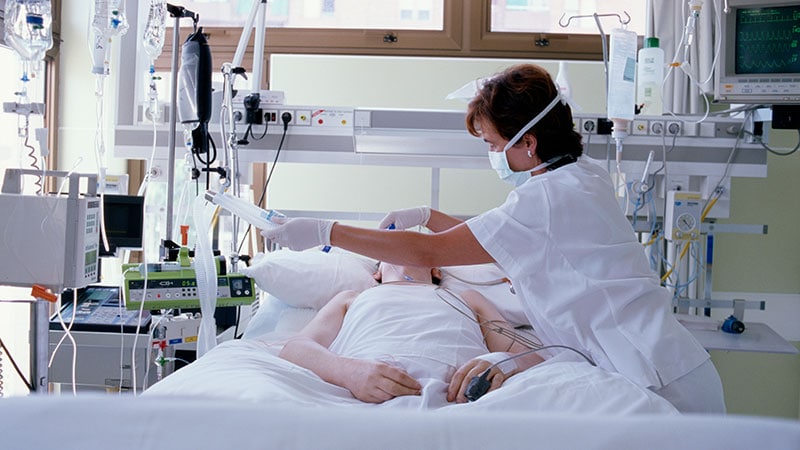Bariatric Surgery Tops Usual Care in Type 2 Diabetes
Randomized clinical trial data showed continued long-term improvement in diabetes outcomes with bariatric surgery compared to medical/lifestyle intervention in people with type 2 diabetes and a baseline body mass index of 27-45 kg/m2.
The findings come from The Alliance of Randomized Trials of Medicine versus Metabolic Surgery in Type 2 Diabetes (ARMMS-T2D), a pooled analysis from four single-center randomized trials in the United States. At 7 years of follow-up, the 193 randomized to one of three types of bariatric procedures had lower A1c levels and higher rates of diabetes remission than the 96 randomized to medical/lifestyle intervention (usual guidance on eating and activity, plus medications for some).
Originally presented in June 2023 at the annual Scientific Sessions of the American Diabetes Association and reported by Medscape Medical News at the time, the data were published on February 27, 2024, in JAMA by Anita P. Courcoulas, MD, chief of the Minimally Invasive Bariatric Surgery Program at the University of Pittsburgh Medical Center, Pittsburgh, Pennsylvania, and colleagues.
Study Co-author Ali Aminian, MD, director of the Bariatric and Metabolic Institute at the Cleveland Clinic, Cleveland, Ohio, told Medscape Medical News, "We've shown that surgery is very durable in terms of diabetes control, in need for diabetes medication, and in weight loss. Other sources have shown durability for 25-30 years, but those were not in the setting of randomized clinical trials comparing surgery with medical treatment."
In an accompanying editorial, Thomas A. Wadden, PhD, of the Department of Psychiatry, Perelman School of Medicine, at the University of Pennsylvania, Philadelphia, Pennsylvania, called the study "excellent" and "well-controlled" and that it "provides the most robust evidence to date of the long-term efficacy of bariatric surgery for improving control of type 2 diabetes."
However, Wadden and colleagues pointed out that the four trials comprising ARMMS-T2D "were launched well before semaglutide and tirzepatide were approved for type 2 diabetes and, later, for obesity. These medications have the potential to transform the management of both these diseases," pointing to data showing that weight, diabetes, and cardiovascular benefits achieved with those medications are similar to those seen with bariatric surgery.
Aminian noted, "It's like with heart disease, where you treat some patients with medication and some with lifestyle and some patients are going to get stents and some open heart surgery…All are options, depending on the patient's situation and severity of disease and response to other treatments. I think all are good options and patients should have access to all of them."
The editorialists also noted that the up-front costs of the surgery — potentially reaching $33,500 — is generally considered cost-effective, whereas the medications, currently costing more than $1000 per month with the possibility of lifelong use, could far exceed that of surgery and pose daunting challenges for insurers.
According to Aminian, "eventually, the cost of medications will decrease, and medication is going to be more accessible…But at this point, in my experience, surgery is just a one-time cost of about $15,000-$25,000, which would be relatively similar to the cost of these medications for about 18 months at the current price tag."
Significant Diabetes Improvements Remain at 7-12 Years Following Bariatric Surgery
In ARMMS-T2D at 7 years, A1c decreased by a nonsignificant 0.2 percentage points from a baseline of 8.2% in the medical/lifestyle group compared with a significant 1.6-point drop from a baseline of 8.7% in the bariatric surgery group. Between-group differences were −1.4 points at 7 years (P < .001) and −1.1 for n = 166 with 12-year data (P = .002).
At 1 year, diabetes remission had been achieved in 50.8% with surgery vs 0.5% with usual care. By 7 years, remission was 18.2% with the surgery vs 6.2% with usual care, still a significant difference (P = .02). Use of glucose-lowering medications was also significantly lower in the surgery group, with 16% vs 56% using insulin at 7 years (P < .001).
There were no significant differences through year 12 between the groups in deaths or other major adverse events except for fractures (13.3% vs 5.2%) and anemia (12% vs 3.1%).
During the follow-up, 25% of those randomized to the medical/lifestyle group decided to undergo bariatric surgery, but they were kept in the original group because the study design specified an intention-to-treat analysis. Thus, Aminian pointed out, "many of those patients had improvements in their blood glucose, excess weight and need for diabetes medication after crossing over…So that basically means the data we see in the medical group actually look better."
Wadden and colleagues concluded, "Although clearly challenging to conduct, long-term evaluations are needed that compare bariatric surgery and the new generation of anti-obesity medications on safety, clinical and cost-effectiveness, patient acceptability, and quality of life. It will be critical to examine the time horizon of cost-effectiveness/savings, as well as patient subgroups that demonstrate cost benefits."
Meanwhile, the editorialists advise, "we encourage clinicians to consider the long-term benefits of bariatric surgery — a vastly underutilized intervention — for individuals with type 2 diabetes not adequately controlled by medical and lifestyle therapies."
The ARMMS-T2D collaboration was supported by the National Institute of Diabetes and Digestive and Kidney Diseases. Courcoulas reported receiving grants from Alllurion and Eli Lilly outside the submitted work. Aminian reported receiving grants and personal fees from Medtronic, Eli Lilly, and Ethicon outside the submitted work. Wadden reported serving on advisory boards for Novo Nordisk and WW (WeightWatchers).
Miriam E. Tucker is a freelance journalist based in the Washington, DC, area. She is a regular contributor to Medscape Medical News, with other work appearing in the Washington Post, NPR's Shots blog, and Diatribe. She is on X: @MiriamETucker.


 Admin_Adham
Admin_Adham


